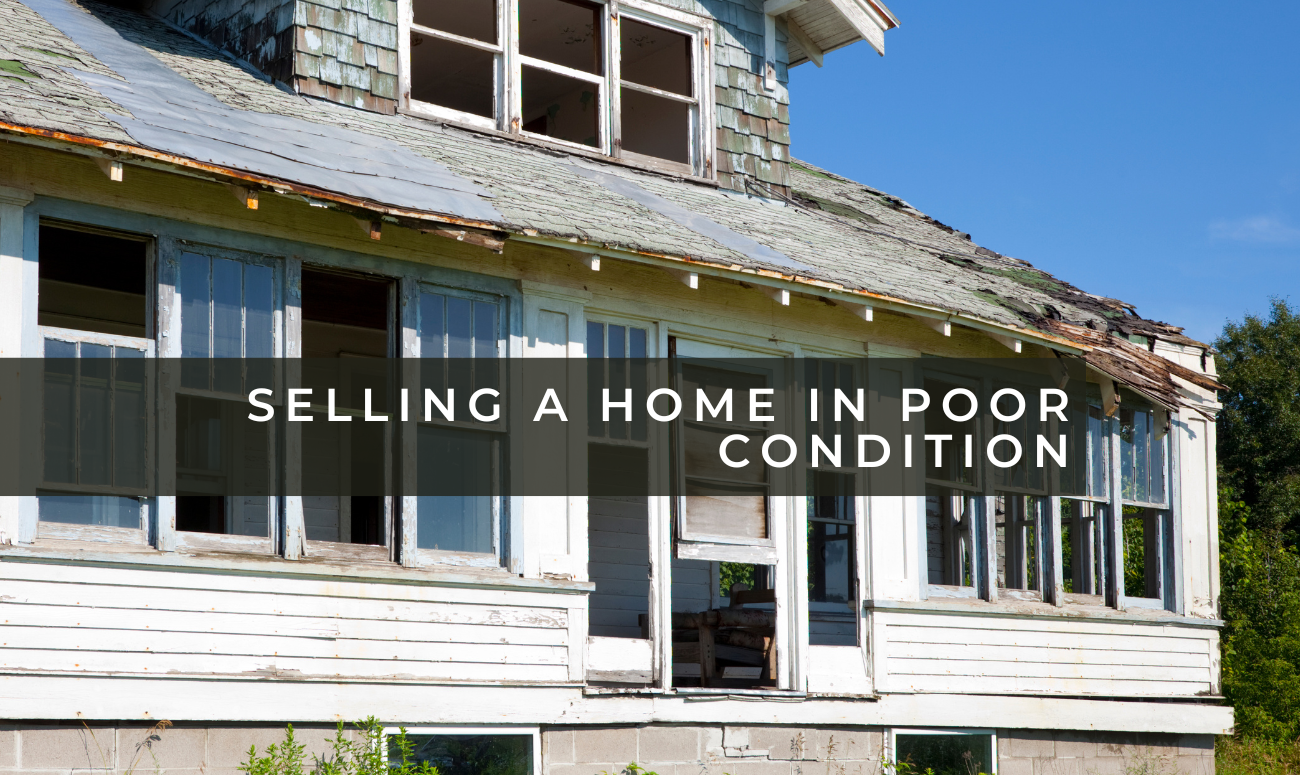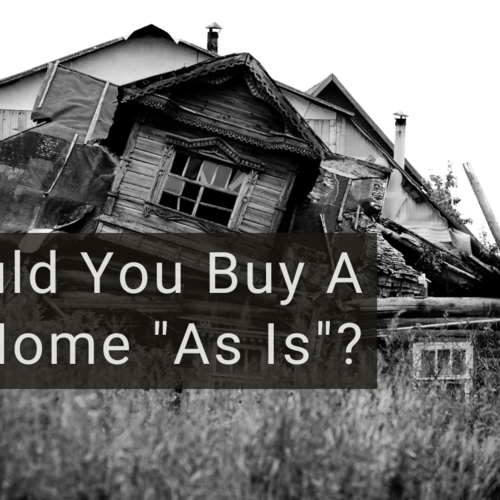Selling a Home in Poor Condition: Strategies for Success in St. Petersburg’s Real Estate Market
As a Realtor with Avalon Group Realty in St. Petersburg, FL, I’ve seen my fair share of properties in various conditions. Today, I want to dive into the often challenging but potentially rewarding world of selling homes in poor condition. Whether you’re a homeowner looking to offload a property that’s seen better days or an investor seeking opportunities, understanding the nuances of this market can make all the difference.
Selling a Home in Poor Condition: The Reality of Selling Distressed Properties
First and foremost, it’s crucial to acknowledge that selling a house in poor condition presents unique challenges. These properties often spend more time on the market and typically sell for less than their well-maintained counterparts. However, with the right approach, you can still achieve a successful sale.
Aaron Hunt, Broker of Avalon Group Realty, offers this insight: “In St. Petersburg’s competitive market, even homes in poor condition can find buyers. The key is to understand your target market and price the property accordingly. We’ve seen investors and first-time buyers alike show interest in these properties, each with their own motivations and expectations.”
Understanding Your Market
Before diving into selling strategies, it’s essential to understand who your potential buyers might be. Generally, we see three main types of buyers interested in properties in poor condition:
- Individual Buyers: Often first-time homeowners looking for affordable options they can gradually improve.
- Investors: Seeking properties with potential for renovation and resale or rental.
- Cash Buyers: Similar to investors but often able to close deals more quickly.
Each of these buyer types has different priorities and concerns, which should inform your selling strategy.
To Make Repairs or Not: That is the Question
One of the most common dilemmas sellers face is whether to invest in repairs before listing. While it’s true that homes in better condition generally sell faster and for higher prices, not all repairs offer a good return on investment.
Yvette Kim, a fellow Realtor at Avalon Group Realty, shares her perspective: “In my experience, focusing on high-impact, low-cost improvements can make a significant difference. Fresh paint, basic landscaping, and addressing any glaring safety issues can enhance a property’s appeal without breaking the bank.”
Indeed, certain repairs can yield substantial returns:
- Painting: A fresh coat of paint can dramatically improve a home’s appearance.
- Flooring: Repairing or replacing damaged flooring can enhance overall aesthetics.
- Landscaping: Simple yard maintenance can boost curb appeal significantly.
On the flip side, major renovations like kitchen or bathroom overhauls often don’t recoup their costs in the sale price, especially for properties already in poor condition.
Pricing Strategies for Success
Setting the right price is crucial when selling any property, but it becomes even more critical for homes in poor condition. Overpricing can lead to prolonged time on the market, while underpricing might leave money on the table.
Pam Amante, another experienced Realtor, emphasizes the importance of accurate pricing: “When pricing a home in poor condition, it’s essential to consider not just the property’s current state but also its potential. We need to factor in the cost of necessary repairs and renovations that buyers will likely undertake.”
To set a competitive price, consider the following:
- Comparative Market Analysis: Look at similar properties in poor condition that have recently sold in your area.
- Repair Estimates: Factor in the cost of major repairs or renovations the property needs.
- Location Value: Even in poor condition, a property in a desirable location may command a higher price.
Selling a Home in Poor Condition: Marketing Matters: Highlighting Potential
When it comes to marketing a property in poor condition, honesty is indeed the best policy. However, that doesn’t mean you can’t highlight its potential.
In our listings, we focus on:
- Location benefits
- Lot size and any unique features
- Potential for customization or expansion
- Any recent updates or improvements, no matter how minor
Additionally, we’ve found that professional photography can make a significant difference, even for properties in poor condition. Good lighting and wide-angle shots can help showcase the space’s potential.
The “As-Is” Option: Pros and Cons
Many sellers of properties in poor condition opt for an “as-is” sale. This approach can be attractive as it simplifies the selling process and can appeal to buyers looking for a project.
However, Aaron Hunt cautions: “While ‘as-is’ sales can be effective, they often imply underlying issues with the property. We prefer to be upfront about the property’s condition while highlighting its potential. This approach tends to attract serious buyers who understand what they’re getting into.”
Legal Considerations and Disclosure Requirements
When selling a property in poor condition, it’s crucial to understand your legal obligations. In Florida, sellers are required to disclose known defects that materially affect the property’s value.
Yvette Kim adds, “Transparency is key in these transactions. We always advise our clients to disclose any known issues. It not only protects them legally but also builds trust with potential buyers.”
Negotiation Strategies
Negotiating the sale of a property in poor condition requires a delicate balance. On one hand, you want to maximize your return; on the other, you need to be realistic about the property’s condition.
Some effective negotiation strategies include:
- Highlighting the property’s strengths, such as location or lot size
- Being prepared with repair estimates to justify your asking price
- Considering creative financing options to attract buyers
- Being open to contingencies that allow buyers to secure financing for both purchase and renovation
Pam Amante shares her experience: “In negotiations, knowledge is power. We arm our clients with market data, repair estimates, and a clear understanding of the property’s potential. This allows them to negotiate from a position of strength, even when selling a property in poor condition.”
Selling a Home in Poor Condition: Closing the Deal
Finally, when you’ve found a buyer and agreed on terms, it’s crucial to work with experienced professionals to ensure a smooth closing process. This includes:
- Working with a real estate attorney to review all contracts
- Ensuring all necessary disclosures are made
- Being prepared for potential issues that may arise during inspections
- Staying communicative and responsive throughout the process
Maximizing Value: Beyond Traditional Selling Strategies
While traditional selling methods can be effective for properties in poor condition, sometimes thinking outside the box can yield better results. In St. Petersburg’s diverse real estate market, alternative approaches can often uncover hidden opportunities.
Exploring Auction Options
One strategy that’s gaining traction in our area is the use of real estate auctions. This approach can be particularly effective for properties in poor condition, as it creates a sense of urgency and competition among buyers.
Aaron Hunt notes, “Auctions can be a game-changer for hard-to-sell properties. They attract serious buyers and often result in quicker sales. However, it’s crucial to set a realistic reserve price to ensure you’re not selling below market value.”
When considering an auction, keep in mind:
- Marketing is key: Extensive pre-auction marketing can attract more potential buyers.
- Choose the right auctioneer: Look for someone with experience in properties similar to yours.
- Understand the costs: Auction fees can be higher than traditional selling methods.
Tapping into the Investor Market
St. Petersburg’s real estate market has seen a surge in investor activity, particularly for properties in need of renovation. Targeting this market can open up new possibilities for sellers.
Yvette Kim shares her experience: “Investors often see potential where others see problems. They’re typically looking for properties they can renovate and either flip or rent out. Understanding their motivations can help sellers position their properties more effectively.”
To appeal to investors, consider:
- Providing detailed information about the property’s potential rental income
- Highlighting any zoning advantages or potential for property expansion
- Offering flexible closing terms, as investors often prefer quick closings
The Power of Social Media Marketing
In today’s digital age, leveraging social media can significantly expand your property’s reach. Even homes in poor condition can benefit from strategic online marketing.
Pam Amante emphasizes the importance of digital strategies: “We’ve had great success using platforms like Instagram and Facebook to showcase before-and-after transformations of similar properties. This helps potential buyers visualize the possibilities.”
Some effective social media strategies include:
- Creating virtual tours that highlight the property’s potential
- Sharing renovation ideas and inspiration for the property
- Targeting ads to specific buyer demographics, such as first-time homeowners or investors
Partnering with Local Businesses
Another innovative approach is partnering with local renovation businesses. This can provide potential buyers with a clearer vision of the property’s potential and may even lead to package deals.
For instance, we’ve successfully collaborated with local contractors to offer buyers renovation estimates along with the property listing. This approach can:
- Make the property more attractive to buyers who are intimidated by renovation projects
- Potentially increase the sale price by showcasing the property’s post-renovation value
- Speed up the sale process by addressing buyer concerns upfront
Leveraging Energy Efficiency Incentives
Even properties in poor condition can benefit from the growing interest in energy efficiency. St. Petersburg offers various incentives for energy-efficient upgrades, which can be a selling point even for homes needing extensive renovation.
Aaron Hunt advises, “Highlighting potential energy efficiency improvements and available incentives can attract environmentally conscious buyers. It’s about selling the future potential, not just the current state.”
Consider providing information on:
- Local rebates for energy-efficient appliances and systems
- Potential energy savings from upgrades like improved insulation or new windows
- The property’s potential for solar panel installation
In conclusion, selling a home in poor condition doesn’t mean you’re limited to traditional methods or reduced expectations. By thinking creatively and leveraging all available resources, you can often uncover hidden value and attract buyers who see the diamond in the rough. At Avalon Group Realty, we’re committed to exploring all avenues to ensure our clients achieve the best possible outcomes in St. Petersburg’s dynamic real estate market.
Selling a Home in Poor Condition: In Conclusion
Selling a home in poor condition in St. Petersburg’s real estate market presents unique challenges, but with the right approach, it can also offer rewarding opportunities. By understanding your market, setting realistic expectations, and working with experienced professionals, you can navigate this process successfully.
Remember, every property, regardless of its condition, has potential. Our job as Realtors is to help sellers showcase that potential and connect with buyers who can see it too.
If you’re considering selling a property in poor condition in the St. Petersburg area, don’t hesitate to reach out. At Avalon Group Realty, we have the experience and expertise to guide you through this process and help you achieve the best possible outcome.
About the Author: Rob Johnson, Realtor is co-owner along with Aaron Hunt, broker at Avalon Group Realty. Both are respected experts in St. Petersburg’s real estate market. With extensive experience in property sales, financing, and home improvement, Rob and Aaron provide valuable insights on selling houses in all conditions.
Learn more about Aaron Hunt and Avalon Group Realty’s featured listings and success stories. Aaron can be reached via email at [email protected] or by phone at 727-262-7920. For years, Aaron has helped people buy and sell homes throughout the St. Petersburg area.
Are you considering selling your home? Aaron is passionate about real estate and loves sharing his marketing expertise!
Avalon Group Realty services real estate sales in St. Petersburg and surrounding areas in Pinellas County, Florida. Visit www.avalongrouptampabay.com for more information on our services and listings.




